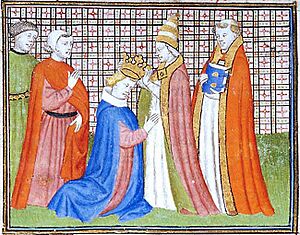Antipope Nicholas V facts for kids
Quick facts for kids Nicholas V |
|
|---|---|

Antipope Nicholas V crowns Louis IV the Bavarian; 12 May 1328
|
|
| Elected | 12 May 1328 |
| Papacy began | 12 May 1328 |
| Papacy ended | 25 July 1330 |
| Orders | |
| Consecration | 12 May 1328 by the then-Bishop of Venice |
| Personal details | |
| Birth name | Pietro Rainalducci |
| Born | c. 1258 Corvaro, Lazio, Italy |
| Died | 16 October 1333 Palais des Papes, Avignon, France |
Nicholas V, whose real name was Pietro Rainalducci, was an important figure in the history of the Catholic Church. He was known as an "antipope" from 1328 to 1330. An antipope is someone who claims to be the Pope but is not recognized by the main Church. Nicholas V was the last antipope chosen by a Holy Roman Emperor. He lived during a time when there were disagreements about who should lead the Church.
Early Life
Pietro Rainalducci was born around 1258 in Corvaro, a historic town near Rieti in Lazio, Italy. In 1310, after separating from his wife, he joined the Franciscan order. The Franciscans are a group of Christians who follow the teachings of Saint Francis of Assisi. Pietro became well-known as a preacher, sharing his religious messages with many people.
Becoming an Antipope
Pietro Rainalducci was chosen as an antipope because of the influence of Louis the Bavarian. Louis IV was a powerful ruler who had been excommunicated by the official Pope, Pope John XXII.
An assembly of priests and ordinary people elected Pietro on May 12, 1328. He was then consecrated, meaning formally made a religious leader, at Old St. Peter's Basilica in Rome. The bishop of Venice performed the ceremony. This event marked the beginning of his time as Nicholas V.
His Time in Power
After his election, Nicholas V stayed in Rome for four months. He then moved with Emperor Louis IV to Viterbo. However, in December 1328, a representative of the official Pope, Cardinal Orsini, started a campaign against Viterbo.
Nicholas V then moved to Grosseto and later to Pisa. In Pisa, he was protected by the Emperor's local representative. On February 19, 1329, Nicholas V led a public event in the Duomo of Pisa. During this event, a straw puppet dressed like Pope John XXII was formally condemned and "executed." This was a symbolic act to show their opposition to the official Pope.
Later Life and Pardon
In April 1329, Nicholas V was officially excommunicated by Pope John XXII. He then sought safety with Count Boniface of Donoratico near Piombino.
Later, Nicholas V was promised forgiveness. He confessed his wrongdoings first to the archbishop of Pisa. Then, on August 25, 1330, he went to Avignon and confessed to Pope John XXII himself. Pope John XXII forgave him.
Nicholas V remained in the papal palace in Avignon under respectful imprisonment until his death. He passed away in October 1333.
See also
 In Spanish: Nicolás V (antipapa) para niños
In Spanish: Nicolás V (antipapa) para niños
 | Calvin Brent |
 | Walter T. Bailey |
 | Martha Cassell Thompson |
 | Alberta Jeannette Cassell |

